#toolbox for adhd
Explore tagged Tumblr posts
Text
Your ADHD Toolbox
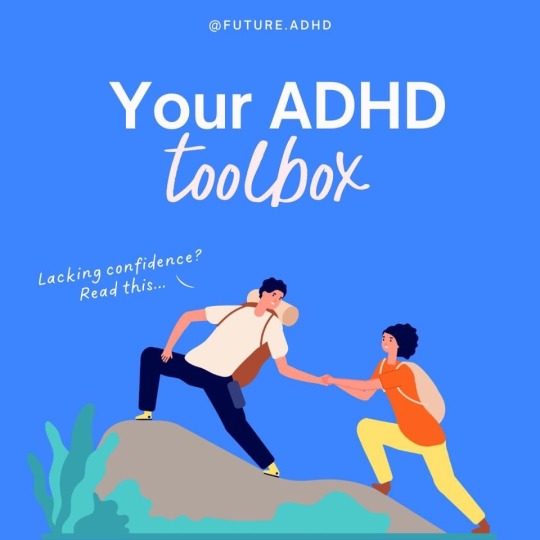
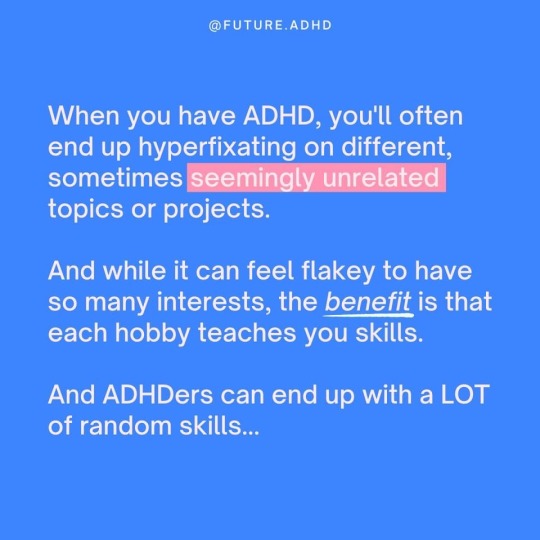
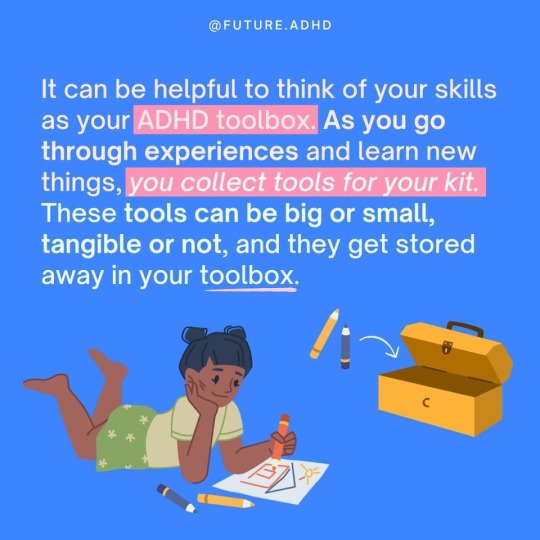
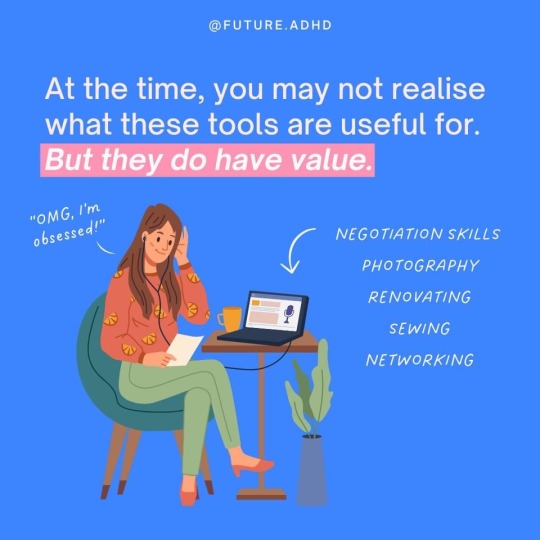
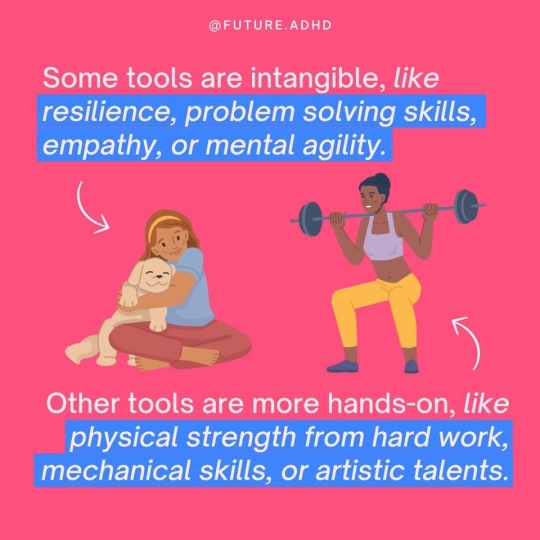
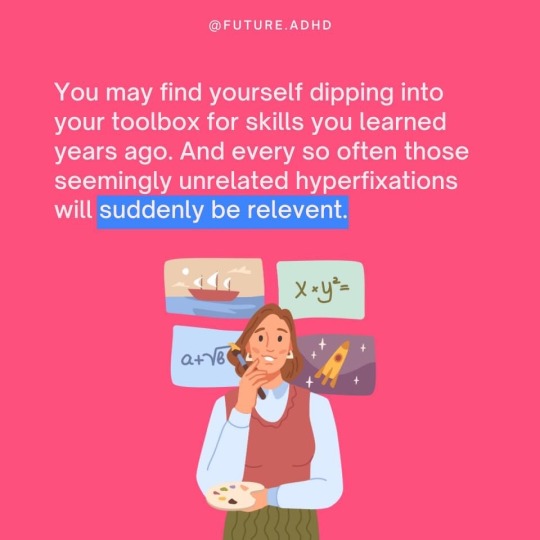
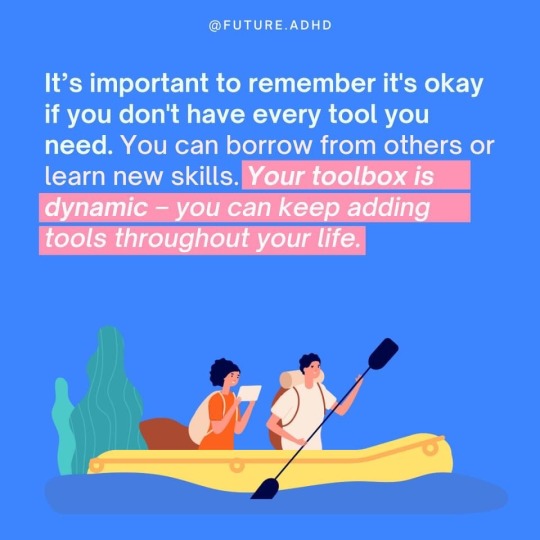
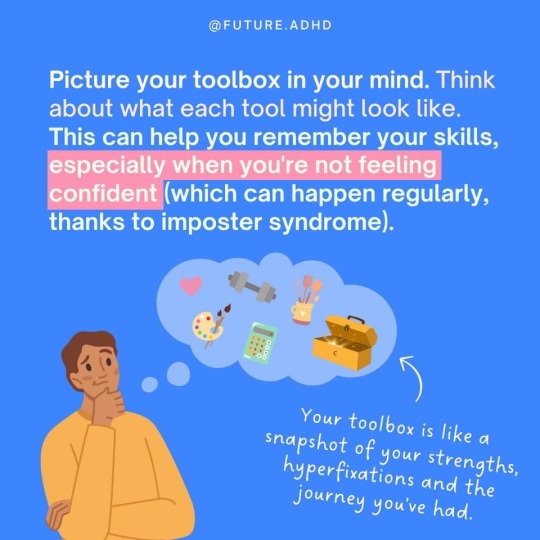
Future ADHD
#ADHD#adhd post#adhd help#adhd things#adhd toolbox#mental health#hyperfixation#neurodivergence#neurodiversity#actually neurodivergent#feel free to share/reblog#Future ADHD (Facebook)
127 notes
·
View notes
Text
Gaige taking a shower and not coming out for 4 hours because while she was in there she decided to re-plumb all the drain piping. And while she was doing that she decided to update the shower lighting. And then partway through both of those things she forgot about either of them and just stood there for an hour thinking about dark energy and the infinite expansion of the universe. And then she realized she forgot to ever even take her clothes off.
#in my mind Gaige has the most chaotic ADHD like she will just start doing Anything the second she thinks of it#she finally emerges pruny as hell with her soaking wet toolbox in tow#borderlands#gaige the mechromancer#was thinking about this in the context of Mechrogunner lol#someone on sanctuary being like ‘uh ? should we like. go in after her?’#and Moze barely looking up just like ‘Nah she brought her toolbox. she’ll be in there all day.’
49 notes
·
View notes
Text
I have a way of thinking about this that might be slightly unique. I have ADHD. So I have a thing that I like to call “emotional labor”. Here’s how it works. So I had a 19 page (single spaced) short story that I wrote like two years ago. Now for me, the task I loathe is editing short stories. I love writing them, but I detest editing them.
This is one of those things that goes to show that most people with ADHD wouldn’t really have the same struggles with tasks if they were wealthy or successful enough to just have an assistant. They could just delegate those tasks to them. Anyway, so doing the task took an hour and a half, but really, it took three hours. There was an hour and a half before hand where it was consciously on my mind and it was the thing that I was doing but it required an hour and a half of me, building the foundation and working up to getting started only to have it crumble apart and then having to start all over again, building the willpower and building the foundation to get started and then being distracted by something and I try to come back to the task and the block is there.
It took me an hour and a half of redirecting myself again and again, and again in order to actually even get to the point where I could get past that mental nausea and start a task. Possibly half a dozen times I arose on the precipice filled with that mental nausea before I could actually cross over the line and get started. Once I did that, it was fine because the task itself is not that hard. However, also, because at that point, I knew how incredibly rare and difficult it was to actually start this task, and I was not going to pause this task for anything. I knew that it could be months before I might get enough momentum again to get past that start line and actually edit this damn story. I knew that because I was aware of how much emotional labor goes into doing some physical tasks that I have a block on. 
Here’s the reason I think of it like this. If I just think that this was just an hour plus task that took me all evening, the fact that I am tired afterwards and need to take a nap will be completely weird because I didn’t really do anything. If I think about the fact that I had an hour and a half of severe mental stress dealing with this mental nausea, Feeling the severe sense of mental nausea at the idea of doing this task as if it’s just a bad sign or some kind of dire omen or something. When I actually consider the full three hours spent doing the task it seems like something that when I have to do that thing in the future, I have a better sense of how long the thing will actually take me from the moment I sat down and endeavor to begin to the moment when I actually get done. Is it efficient to spend an hour to do a five-minute phone call? No but is it doable on an average day to block out an hour to do a five minute phone call?
Absolutely. 
[Just to clarify because I know how I am, but my autism means that sometimes I don’t know how other people are. I need to clarify that just deciding to do the task and then just ignoring it and coming back two days later and getting it done does not count as the task having taken two days. I mean dealing with standing there completely feeling that block that’s preventing you from doing that task and that negative physical effects that trying to move through that block takes on you. It’s an hour and a half of that experience you need to go through I n order to actually break through it and do the actual task. It’s the honor system. Just deciding to clean the kitchen floor and then not thinking about it much at all for a day and a half and then doing it because you suddenly got a burst of willpower does not mean that the task took two days. It took five minutes. I hope that makes sense because I can’t explain it any better.] 
Guy did you know that if you make the phone call then the phone call is made and it's actually quite fast and easy to do and will stop haunting your to-do list for months?
9K notes
·
View notes
Text
what triggers a shift?
reality shifts, as we call them, are not exactly something you do, they're more like something you let happen.
you could shift while jogging, cooking, cleaning, or watching tv. this is because the stuff you are doing with your body in the 3D reality you currently perceive is irrelevant to whether you can shift or not. your 3D body is not what makes you shift, and therefor it is not what holds you back from shifting either. i do think, however, that due to the way we perceive the 3D as a constraint, we have an easier time shifting if we find out what triggers us to shift, and then using those techniques as we get into the prime state for shifting to happen.
if we look across all "shifting methods," we begin to see patterns, and similarities across communities. boiling down these methods, there are three tools used across a wide variety of them that i've identified. most methods include or involve relaxation, visualization, and repetition. i have my own theories for why these tools help with shifting, but let's get into how to use them your own way in the context of shifting.
authors note: please please please don't overthink these tools, or think you have to use these tools the same way others do in order to shift. i think this leads a lot of people into being stumped, thinking "i did the exact same things in the same order that shifter123799 did on tumblr.com, so why did they shift and i didn't?" methods like alice in wonderland, raven method, etc sometimes play into this because they tell you step by step what to think and when to think it. the techniques below are not that. the things below are not methods. they are tools you should learn to use in your own way, if they help you. they are not steps to take in order to shift, but tools in your toolbox that you can use in your own way, however that works for you. don't think: "how does shimmer relax, visualize and repeat? if i do it the same way, then i will shift."
instead think, "what helps me relax? how do i naturally visualize? is repetition helpful for me?"
relaxation
first and foremost, you don't have to be relaxed to shift. however, lots of people, especially beginners find it easier that way. something about reaching a relaxed state seems to help trigger a reality shift in a lot of people. maybe it's just easier to let the shift happen in the 5D when you're relaxed in the 3D. because again, i don't think shifting is something we "do" the way we wave our arms or stomp our foot. our awareness just happens to have the capacity to shift into a different 3D reality, and we're trying to get into a state where that's likely to happen.
lots of methods out there include some form of relaxation technique, like counting, breath control, staying still, meditation, calming your mind, etc but i implore you to think about what relaxes you. all of those techniques could work for somebody, but what matters is what works for you. when you're laying down to go to sleep, would you feel relaxed by forcing your mind to be quiet and forcing your body to be still? if not, that may not be the right relaxation technique for you.
one tip i will give, is that there is a difference between relaxing your body, relaxing your mind, and relaxing your awareness. i think it can be helpful to learn how to do each one, and figure out which one (if any) helps trigger a shift for you. i promise you already know how to relax. how do you relax? what do you already do to relax? it can be fun or helpful to try other people's way too, and maybe you find something that really enhances your experience, but don't lose sight of how simple it is to relax.
sidebar: if you're like me and have c-ptsd, anxiety, adhd, or something similar, it can be daunting or frustrating to be told to "just relax." so, again, you don't have to be relaxed to shift. if relaxation isn't a tool that works in your toolbox, don't pack it, scroll down to the other tools below. but if you just have trouble relaxing your body, maybe try relaxing your mind instead. or if you have trouble relaxing your mind, maybe focus on relaxing your body first. you can also learn to relax your awareness, without relaxing either of those things.
visualization
this is one of the most powerful tools for shifting, in my personal opinion. i think this is because our awareness can struggle to discern the difference between 3D reality, and a visualization, especially when we are in a state of being primed to shift (pure awareness, lack of awareness, or destabilized awareness.) this is because your awareness is not physical, it is not 3D. there is no one specific atom or molecule or body part where you can point and say "there it is, that's human awareness." that's why we can shift in the first place. your awareness is not 3D, it's simply getting its data and input sent to it from the 3D via the brain. so the point of visualization, in the context of shifting, is to disrupt that flow of data and input and say "hey, look at this instead, oooo shiny visualization, look here," and your awareness probably will.
there are tons of different ways people like to visualize, and please know that you don't need to copy other people's visualization in order to shift. it's not what you are visualizing that causes a shift, but how you are visualizing and what state of awareness you are in while you're doing it that i think plays a key factor. find whatever way you like to visualize. again, don't overthink this. i promise you already know how to visualize. yes, even those with aphantasia, because visualization does not just mean actually seeing things visually in your mind. if the term "visualization" stumps you, try "thinking of a representation" instead. some people like to imagine the actual sensations of sight, sound, touch, scent or taste as if they're feeling it now. but maybe when you "visualize" you're just thinking of how those things would feel, or listing it verbally.
so to be absolutely clear, your goal is not to visualize so hard that you start feeling these things with your 3D body in this reality. (side note, it's awesome if you can do that, but it's not needed for shifting!) if your goal is to shift, your goal is not to feel these things with your 3D body in this reality, your goal is to shift your awareness into a reality where your body is already feeling these things. when you are doing your visualization technique in this reality, you are not trying to create or materialize these sensations, but to trigger your awareness to shift in the direction of where you already have those experiences. while visualizing your DR scene or whatever, stop searching for those sensations with your 3D senses here. trigger your awareness to shift to them elsewhere.
repetition
honestly, repetition is the double edged sword. i think repetition can help with shifting. repeating visualization, repeating thoughts, repeating methods, repeating in general can have a strong affect on triggering a shift. we learn by repetition. the more times we're introduced to something, the more comfortable we feel with it. repeating the same visualization over and over can help sink it into your mind. repeating the same relaxation technique can help you sink into relaxation faster each time you use it, because your body or your mind or your awareness begins to recognize and accept it easier.
but i think it can be helpful to consider what you're repeating, and whether you're doing it mindfully. repeating something can make it easier, but it can also get you stuck in a rut. the more times we repeat something, the more comfortable we are with it... are you repeating something over and over that's not working for you, and getting too comfortable with things not working? are you repeating the same method over and over because that repetition is serving you, or are you mindlessly repeating it because you don't know what else might serve you?
mindless repetition can also be a tool, if you're using it for a specific purpose. ie, there are lots of counting methods or repeating mantra methods out there designed to help you repeat the same thing over and over in the 3D until your awareness begins to drown it out, therefore de-centering the 3D and moving to a state of pure awareness, or lack of awareness. but is that what you're doing, or even trying to do?
so, i suppose my advice is to use repetition, but to use it with purpose.
#shifting community#reality shifting#shiftblr#shifting#shifting realities#shifting motivation#reality shifter#desired reality
218 notes
·
View notes
Note
Hiii i love ur writing, do u think u could do something for Sev with a reader w adhd ?? How shed keep you on task but not condescendingly and remind you to get up and eat, listen to you talk about fixations and stuff :) having a hard time with people calling me distracting and lazy atm and some cute fluff would be adorbs if u have any time !! :)
sure!!
men and minors dni
sevika takes it upon herself to put reminders, alarms, and appointments in your phone for you. she knows that you fully intend to each time, but you just forget. she doesn't mind slipping your phone out of your pocket and setting a quick alarm titled 'facetime mom' at 8 pm after overhearing you making the plan over the phone earlier that day.
she thinks it's adorable when you get super intense and focused on a project. even if it's completely absurd. in fact, she realized she was in love with you one night when she stumbled home and found you in her kitchen, your phone playing a tutorial video, your laptop playing a movie, the radio playing music, surrounded by parts of her once-assembled microwave.
"babe?" she asked, blinking down at you.
you looked up at her and smiled. "hi love! your microwave was makin' a weird noise, but then when i started looking into it i realized it needed a deep clean. but then i got distracted taking it apart because i've always been curious as to how microwaves work-- like i get that it's radiation but how is it conducted? and where does it go? so i found a manual and got out the toolbox..."
you ramble on while sevika looks down at you fondly, a small smile on her lips as she realizes she's not even a little bit mad. in fact, she's happy that you've trashed her microwave, because you seem so interested and entertained. she's gone completely soft for you.
she'd also really appreciate the fact that you're always 'bugging' her. that's what you call it, worried that you distract her when you chat her ear off or track her down across the house to ask her what her favorite species of fish is, but she always assures you it's the exact oppisite.
sevika's mind doesn't work like yours. when she's in 'work' mode, it's all she's focused on. so when she's scrubbing the tiles of the kitchen, or filing your taxes, or tinkering on her arm, she's never expecting your funny questions or sweet anecdotes. you're always surprising her, making her bark a sweet laugh as she tries to think up a response to your ramblings. in short: you keep her entertained, you keep her day to day life lively.
and, if she ever overheard someone calling you annoying or distracting or lazy, she'd go to war for you babe. she knows how frustrating it is for you sometimes the way your mind works, but she also sees how unique and special it makes you, and she's never gonna let somebody else make you feel like shit for something she loves so much about you.
taglist!
@fyeahnix @sapphicsgirl @half-of-a-gay @thesevi0lentdelights @sexysapphicshopowner @shimtarofstupidity @chuucanchuucan @badbye666 @femme-historian @lia-winther @gr0ssz0mbi3 @ellsss @sevikaspillowprincess @leomatsuzaki @emiliabby @sevikasbeloved @hellorai @vikasub @glass-apothecary @m0numents @macaroni676 @vixel352
153 notes
·
View notes
Text
Tails: I know what Sonic's problem is. He's got ADHD. Maddie: No. Sonic: No, I don't! …What is it? Tails: I'd tell you, but you'd wander off before I got to the "H." [he turns to see Sonic is no longer in the kitchen with them]. My point exactly. [A FEW HOURS LATER.] Tails: Hey, Mom. Maddie: Yes, sweetheart? Tails: Listen to these symptoms of ADHD and tell me it's not Sonic. Maddie: Tails, what have I told you about diagnosing people? Tails: Hey, just because I don't have a degree doesn't mean I can't see the signs. It just means I can share them openly. Maddie [sighs] Knuckles: I want to listen to them. Tails: Thanks. Here. [reads]: "Easily distracted by irrelevant stimuli." [MEANWHILE, IN THE GARAGE] [Sonic opens Tom's toolbox and grabs a screwdriver. He closes the box and walks away humming. The ceiling light flickers, and he and his humming stop. He looks up at the ceiling.] [BACK AT THE KITCHEN] Tails: "Often impulsively abandons one task for another." Maddie [stops the baking and looks at the nothingness] [BACK AT THE GARAGE] [Sonic has climbed onto a slightly wobbly chair and is ready to open the ceiling lamp to fix it. He looks to one side and then turns his head completely.] Sonic: My sunglasses! That's where I left them! [AT THE KITCHEN…] Tails: "A tendency to act without regard to consequences, often at the expense of personal safety." Shadow and Knuckles [exchange a glare and then look at Maddie] [BACK AT THE GARAGE] [Sonic prepares to jump from the chair to the shelf. He stops abruptly] Sonic [laughing]: Wait, wait, Sonic, what're you thinking? [He jumps to the floor, grabs the chair and moves it closer to the shelf, stacking a bunch of thick paperback books on it. He taps the chair. The chair wobbles quite a bit.] Sonic: Now, that's better. [BACK AT THE KITCHEN] Tails: "Having accidents more often"- Maddie: I think that's enough, Tails. We've got it. [A loud crash is heard along with Sonic's scream and a dull thud. They all run to the garage] Maddie: Sonic! Sonic, baby, are you okay? Sonic [emerges from a pile of scattered boxes]: Oof! Yeah, yeah-- Hey! Remember those sunglasses I couldn't find? [shows them to his family]: Bingo! [chuckles] Tails, Knuckles and Shadow [look at Maddie] Maddie: …
#incorrect quotes#sth#sonic the hedgehog#sonic movie universe#sonic movie 3#sonic wachowski#maddie wachowski#tails wachowski#tails the fox#miles tails prower#knuckles wachowski#knuckles the echidna#shadow the hedgehog#source: modern family
96 notes
·
View notes
Note
who do you think would deal better with being isekai'd into omegaverse, marc or vale? alternatively which is more compelling
most beautiful ask. in the world. so funny. ummmm i think. vale is maybe more compelling because his issues with it would be. perhaps unsolvable and endlessly complex. guy who is a lil weird about gender, not terribly into the concept of marriage, and is pretty fundamentally adverse to being. shall we say emotionally legible/vulnerable. exposed. and omegaverse as a genre is all about exposure. its all. giving into the base instincts of your body and those same instincts giving you away to the object of your affections. its going into heat and the person youre in love with is the only one available to help you through it. its scenting someone and that being a crystal ball of their emotions and bodily state ESPECIALLY ie how much they want you specifically. its needing someone so bad you are literally insensate. its getting bonded 5ever and ever irrevocably, OFTEN in the heat of an instinctual moment without the relationship negotiation that happens irl. a genre centered around a betrayal of the body/heart to the mind, in many ways
now imagine you didnt actually grow UP in an omegaverse so you have no toolbox to DEAL with all that. sensory input off the SHITS. and. like suddenly and without WARNING now vale can feel in his CHEST exactly how distressed marc marquez is about every one of their interactions. and how much he wants his ass. like truly every part of his hind brain is like jesus christtttttt i should be inside him right tf now im a terrible alpha. and then the higher part of his brain is like what the fuck. what the fuck. i am not responsible for marc, what the fuck. and oh hey theres a bump on my penis i need to ask people about this right the hell now. thats vale. so i see this as a somewhat fraught comedy of sex errors where his ADHD ass is treading horny water trying to learn alpha manners and also. much more complexly. not fall into all of the traditional alpha expectations/roles. that little trap of gender. because at heart vale is a little trickster who loves to buck expectations!!! and maybe his journey here is realizing that he can just be himself comma sex freak. and that leaning into those "alpha" traits doesnt mean he is conforming lmao he can still have his own unique version of his family. learning the norms of a society and what makes sense to him and what still doesnt. sorting through the weeds of it. and that being vulnerable rules sometimes. and that marc loves him. because that last one is kind of hard to ignore now... again because of that emotional and physical vulnerability that comes with the genre... honestly him knowing all of that about marc without having to actually TALK about it may solve some of their problems tbh. like why work through all that verbally when you can sniff them and then fuck them. kind of the omegaverse fantasy in quite a few ways
marc. jeez louise. i think would HATE it more. at first. control freak 9000. maybe has to miss races for heats. suppressants arent legal. experiencing weird omega sexism if we want to go that route OR. my favorite. has been lying to the press about his status since he presented. tiniest 15 yr old youve ever seen: im an alpha ! :3 uh sure bud. sure. i bet. SO actually maybe he falls into a world where hes just been white-knuckling it for the last billion years during race weekends and most of the paddock kind of KNOW (scent blockers only go so far...) but are lowkey afraid to call him on it dlkjdfljldsfd... similar to vale in this scenario, he sort of has to learn how to omega— and when his heat hits during summer break and his ass start leaking in the middle of the spanish equivalent of walmart, he finds a psycho little ziploc bag of sweaty vale shirts under his bed and he genuinely is like girl what the hellllllllllll.... wiggin out. and his next heat he turns up to race with truly NO practice managing it all, so its way more obvious than normal and the farce is growing thinner and vale literally pulls him aside to be like hey are you GOOD ? but in that valentino not that i care about your ass kind of unspeakably divorced way and marc is like woag. bc a pheromone truck just ran him over. eyes glassy face flushed sweaty as hell mouth a little open.... and he opens his mouth to make an excuse and nothing comes... and then obviously they fuck like its the end of the WORLD
and like i DO think marc pulls out of it more cleanly than vale overall, bc something in HIS lizard brain would be deeply soothed by like. excelling at being an omega. getting an A + in being a bottom. doing that for vale, specifically in the context of pushing his body to the absolute LIMIT to do it.... hes locked in. its go time. and then theres the insane possibility of vale putting his mouth on his neck and them getting basically soulbonded forever where they have to have crazy sex every few months ? hes like ummmm okay. i could get used to this for a while lmao
#huge thanks to dante who worked some of this out with meeeeee#motogp#callie speaks#asks#rosquez#marc is also a noted smell diva. so i think he would really hate/enjoy all that...#meanwhile in another universe vale sniffing arounfd the paddock like. what smells like sexy gasoline. is anyone getting that ? just me ?#and uccio is sitting there like. you KNOW thats marc what the hell#vale as always much harder to solve in a given scenario. dont even know if it makes sense or i agree with it...#like its the new gendered expectation of a REALLY traditional family structure and i mean his family structure NOW isnt really that untrad#but i think coming into NEW gender/societal expectations would be weird ! especially concering the underpinnings of classic abo stories#and a lot of stories are about rebelling against those and i think it could work with vale ! is all im trying to say. badly.#idk send me some asks maybe im working through it
73 notes
·
View notes
Text
Stuff That Helps Me Write: Procrastination Busting (Intro)
My entire writing process, I've learned, boils down to trickery.
I'm the queen of procrastination (I think that royal title automatically comes with your ADHD diagnosis). That applies to literally everything: I will procrastinate eating. Sleeping. Hydrating. Bathroom breaks. Working. Not working. Doing shit I am actively looking forward to. I have a graveyard of games I never finished because I got too close to the end and my brain went ‘I’m enjoying this too much to finish, So I guess I’ll just never play it again’.
So obviously writing’s no exception to my ability to postpone doing anything and everything, but for some reason, it’s impacted less than everything else. So why?
Because it’s my job, but that goes for literally every other part of my job too, and I can procrastinate just fine on those parts. Just look at how long publication takes me.
Because I frequently hyperfocus on it, but in order to get into that state of mind I still have to start, and that’s the part that procrastination impacts the most.
Because I enjoy writing, but as I’ve just said, enjoyment has no bearing on whether I’ll do it. Ditto the fact I find it meaningful, and satisfying, and am invested in where it’s going. None of that makes something immune to procrastination. In fact, as those poor video games show, sometimes that makes me more likely to procrastinate.
So why don’t I generally procrastinate writing?
The fact that it's my job, and I enjoy it, and find it adds meaning to my life, all have in no way made me less likely to procrastinate, but they have meant that for 20+ years, I have been methodically figuring out workarounds for said procrastination. Things will work for a little while, until procrastination inevitably pops right back up with a new excuse, and then I have to figure out a workaround for that one. It’s been a very extended game of whack-a-mole, but I now have an entire toolbox to work with, and writing is now the most consistent thing in my life, only second to reading, which I basically do daily, and don’t consider a ‘habit’ to work on any more than most would consider watching TV or playing video games every day a ‘habit’ to work on.
Now, when I say consistency, I don’t mean I write on Mondays, Wednesdays, or Fridays at 5:30 am with a lit candle and a fragrant mug of tea like I have been told to do (writing guides all seem to require writing before dawn, which is something I only ever do accidentally, wrapping up a ‘whoops, got an idea in the middle of the night’ session).
I have found some things help with that sort of consistency (and that may be another post), but I'm not that kind of consistent. Every week looks different. Every day looks different. But on average I write between 200k and 300k a year, at a rate of between 1000-1500 words a working day. My schedule may vary — I might write five days one week, three days another, might write double one week to the next, might write 12,000 or 30,000 in a month. But when I zoom out, I'm consistent as fuck on a long-term basis (with the caveat that shit can happen, such as family emergencies or ol' bastard eye acting up again)
So uh, how?
All the common wisdom is has been distinctly unhelpful, in my experience. Treats don’t work on me, as I am aware I can just…not do the thing and have the treat anyway. Rewards don’t work on me, because ‘thing in nebulous future’ doesn’t have much to do with me now, does it? Holding myself hostage (‘no dinner/break/bathroom break until you write’) does not work, and should not be done, because those things aren’t rewards, they’re basic bodily functions (…apparently).
This is, I’ve learned, literally due to my wiring. Neurotypical people have an importance based nervous system. Motivating factors for tasks are the task's importance to them (duh) or someone they care about, the rewards associated with completion of the task (offer yourself a treat! Reward yourself at the end!), and the consequences associated with not completing the task.
None of that works on me. Like. At all.
It was only in recent years I learned about the interest based nervous system, and how it’s motivated by completely different things. Things that work to motivate me involve novelty, challenge (some will use competition interchangeably here, but I am not a particularly competitive person), urgency, and, well, interest.
And in hindsight, every single trick that’s ever worked for has touched on at least one of those categories.
I’m going to stop here, because I am literally procrastinating on writing Robbie by writing this, and the irony is too much for me right now, but I think that a larger than average portion of my readership may also be helped by tricks that specifically target novelty, challenge, urgency, and interest.
So, next week — an actual bullet pointed list of shit that tricks my brain into doing the thing. Some are more targeted to writing, some can be applied to plenty of things, but all of them have, at one time or another, made me Do the Thing, which, as the queen of procrastination, is a damn triumph.
41 notes
·
View notes
Text
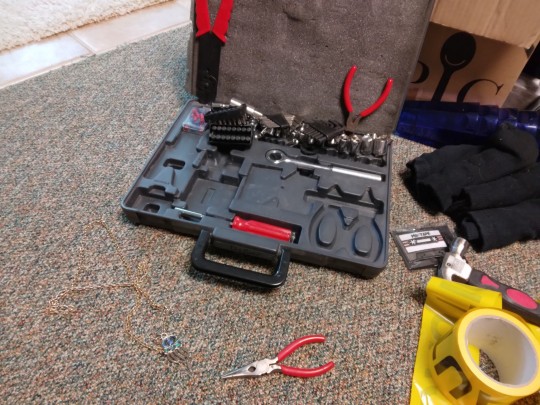
If anyone wants to hear about ADHD, look. I'm reorganizing my stuff all over the bedroom floor (fabric into the clear tote, stuff I rarely use into the cardboard box) and I accidentally picked up my toolbox by the handle and the tools went everywhere. Rather than being upset, my first thought was, "Oh, now that the tools are out, I can take my jellyfish pendant off the rusty chain."
9 notes
·
View notes
Text
Unlocking Potential: Nurturing Children with #Autism 🌟 Does your child face challenges like not responding to their name, struggling to connect with peers, or maintaining eye contact?
Welcome to the Academy of Autism & Child Physiotherapy in #Ranchi! 🌈
Our mission is to empower children with autism and developmental difficulties.
Here’s how we create a world of opportunities:
Individualized Approach: Every child is unique. We tailor our therapies to their specific needs, ensuring personalized care. Our experienced team follows a multidisciplinary approach for holistic development.
Expertise That Matters: With 19+ years of experience, Dr. Lalan Kumar (PT) leads our passionate team. We specialize in evaluating and assessing children with autism, ADHD, and more.
Cutting-Edge Therapies: Stem cell research and Hyperbaric Oxygen Therapy (HBOT) are part of our innovative toolbox. We believe in exploring new frontiers to enhance the lives of our young learners.
NDT Therapy: Dr. Kumar is a trained Neuro-Developmental Treatment (NDT) therapist. We focus on physical, cognitive, and emotional growth.
Contact us today and embark on a journey of progress and possibilities! 🌟 Learn more: Lalan Academy of Autism & Child Physiotherapy
🌐https://lalanautism.com/
📩 Email us: [email protected], 📲 Contact Us:+91-9899272246
#applied behavior analysis#autism#helth care#jharkhand#physiotherapy#ranchi#speech therapy#asd#autism spectrum#bihar#odisha#west bengal#dhanbad#dumka
2 notes
·
View notes
Text
Story Theory: Detail v. Description
So yes, it varies worldwide and by different contexts.
I first posted this on Nanowrimo, which then got used on Writing Excuses by Brandon Sanderson. So I think it's fair to steal it back. As I said, I LOVE extended analogies and at the time no one was making a distinction and a lot of people don't.
Up front: Neither are evil. They are both tools in the toolbox, and how you use them is important. Yes, it varies by context, country, etc. So yes, there are judgment calls.
Definitions
Description is a long introductory paragraph which might carry an emotion, but often doesn't really have the character in it.
Detail is integrated bits of stick-out information.
Analogy
If you have a car, you don't need to know exactly how the carburetor works, what the model of the engine is, what color the exhaust pipe is. But you might want to know that it is red and has flame decals, especially, say if it's a mystery and that's a KEY bit of information to crack the case. If you describe the car, then you're getting every last bit about the make model, the carburetor, etc. That's a description.
But if you're getting the detail, then that's the flame decals.
Theories on how to apply these tools and when to cut.
Description is usually used for slow action, taking a breath, discovery, to slow action down, and generally to set up scenery. Sometimes it's used to set up a character that's new to the narrating character. The key here is that the character must be new to the narrating character, not to the reader.
You cut it when it's the opposite. You want to speed up the action. You don't want to take a breath. It's all action, morality, or conflict. And you aren't setting up scenery/scenery is not key yet.
Detail is a quick in and out of something that is DIFFERENT or STICKS OUT.
Hey, your friend is wearing is bright green sweater, you're going to notice that.
Why cut it all out?
The person has a sensory disability. (I'd urge you to up the other information the character does have in this case)
The person isn't very self aware of anything.
The character narrating isn't very observant, or only observant in certain situations (ADHD and hyper focus can be played with this way)
The character is super self-absorbed
Likewise, if the character is observant, very self-aware, very tuned into others, then these things should increase, BUT when you pick it out, make sure it has purpose. Like the little bit of cereal on his collar and baby food on his shirt pocket tells you he's struggling with his baby.
Examples
Description:
MRS. Rachel Lynde lived just where the Avonlea main road dipped down into a little hollow, fringed with alders and ladies’ eardrops and traversed by a brook that had its source away back in the woods of the old Cuthbert place; it was reputed to be an intricate, headlong brook in its earlier course through those woods, with dark secrets of pool and cascade; but by the time it reached Lynde’s Hollow it was a quiet, well-conducted little stream, for not even a brook could run past Mrs. Rachel Lynde’s door without due regard for decency and decorum; it probably was conscious that Mrs. Rachel was sitting at her window, keeping a sharp eye on everything that passed, from brooks and children up, and that if she noticed anything odd or out of place she would never rest until she had ferreted out the whys and wherefores thereof. --Anne of Green Gables, opening line.
This also characterizes Mrs. Lynde.
Detail:
And yet here was Matthew Cuthbert, at half-past three on the afternoon of a busy day, placidly driving over the hollow and up the hill; moreover, he wore a white collar and his best suit of clothes, which was plain proof that he was going out of Avonlea; and he had the buggy and the sorrel mare, which betokened that he was going a considerable distance. Now, where was Matthew Cuthbert going and why was he going there? --Anne of Green Gables, LM Montgomery
The bolded bits are details, because they stick out to the narrating character, Mrs Lynde.
What should description and detail include?
It's best to include these with an emotion attached, instead of listing them off.
So it's not chocolate chip cookies.
It's grandmother's chocolate chip cookies she made every Sunday without fail. Eating the gooey center made me cry as I stared at the recipe again in her dusty recipe box.
Aim the detail/description at an emotion, or at least towards your story driver. You can see that in even the Anne of Green Gables passage. There is a non-stated emotion in the first paragraph.
With emotion, BTW, doesn't mean writing the previous as,
I ate grandmother's chocolate chip cookies and I felt sad. I looked at the dusty recipe box.
No. Don't tell the emotion. Show the unique way your character has it. Because another character Might face a similar situation and sniff bravely.
Sensory information:
Sight
Color, texture, props, items.
Taste
salty, umame, sweet, aromas, bitter, etc.
C'mon leverage your literary super power as a novel writer.
Hearing
This is often good to combine with sight. For example, the creak of the wooden wheels ad the gravel crunched below in the grand courtyard.
Smell
People who don't go outside forget the smell of everything except food. People *smell*. Flowers smell like things. Smells are carried on the wind. You can't do this in movies, but you can in books. Make your character have this experience.
Touch
Smooth, rough, velvety? Up this for books. Make those screenwriters hate you.
Interoception- sensations from inside the body Belly grumbled with hunger. So tired. Headache.
Vestibular sense (balance) Is the character balanced all of the time?
Time information
What time of day is it? What time of year is it?
Place information
I'm guilty of forgetting to include the setting. But also, you should include where your character is in space. If you're lost, then draw a map with an x and colored pencils every time you move the character.
I also cheat by using programs like Sketch up, the Sims, etc. Make sure your characters don't jump in space. Color code as needed.
If they are up a mountain, down a mountain, about to cross a river, all of these should have a cascading effect on the character and the interactions. Don't forget that the place information should influence how the dialogue is said.
Weather. Don't forget what season it is. If it's sunny all of the time, I'm suspicious, especially if you've set it in England. WTH. Make sure your weather patterns match.
Dreary rain. Sunny. Snowing.
What do characters look like? What are their expressions?
Don't tell what the emotions are. Talk me through how they usually are when they are sad, or playing more than one emotion at a time. If you're limited on time, push it through dialogue.
What does the clothing, food, or customs look like?
The white shirt up there, for example is fast.
So across cultures this varies a bit.
Long descriptions of scenery is more Chinese, as well as describing the characters who usually get long info. Tone set up is usually done by description in traditional Zuni tales.
In Korean, there might be a setting set up with tone and theme attached.
Descriptions might be longer in Japanese works to set up a certain mood.
But I think it's worth it to look at those cultures and how they are pulling it off and what techniques you can learn from them doing it that way. What does the story gain, what does it communicate, how do you feel? How do people of that culture feel about the work? If you're a writer you need to be concerned about more than yourself when it comes to techniques.
Generally, when you're faced with a work that's unfamiliar, try to feel out what it's trying to accomplish by doing it that way and you learn much more than by rejecting it.
But imagine you could be masterful enough to have a scenery description that could set up mood, tone, voice of the story, and the theme all at once because you combed through other people's techniques to arrive there. Wouldn't you feel smug especially if you managed to do all of that in 40 words or less? (English, granted). I think I would.
6 notes
·
View notes
Text
Update + Vault 111!
Hi everyone. I'm doing a little better, at least physically. Mentally, the jury's still out.
First, I'm still working on proofreading the next chapter of Defenders At The Crossroads. (Tiny spoiler: Cassie is getting out of the Vault!) I've also started the next chapter, which will be the last time we see RJ until he and Cassie meet. ADHD is kicking my ass, so everything is taking a lot longer than normal. I'm sorry, and I hope to have it out soon.
Now on to the fun part.
When I was writing the next chapter of DATC, I kept running into a couple of roadblocks. The biggest one was not being able to picture the inside of the Vault.
So, in all of my hyperfixating glory, I sat down and made a blueprint of it. Meet my version of Vault 111:
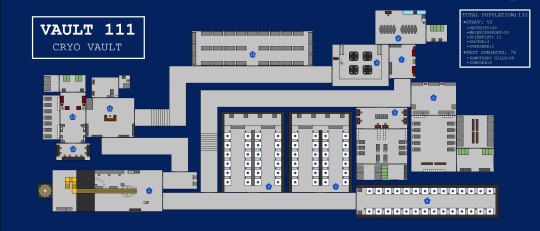
My personal headcanon is that Sanctuary Hills, and Vault 111, are bigger than they are in game. My version of Sanctuary Hills is based off of the neighborhood I grew up (houses were made in the mid-1950s for veterans returning from war). I doubt I will make a map of it.
More about it below the cut.
Yes, it was made in MS Paint. How many hours did I spend? Too damn many. Am I mentally well? No. Would I do this again? Probably not.
The following is a legend of the numbers in each room.
Atrium/Entrance. The mesh on the bridge took a long time to perfect.
Cryo Chamber 1.
Cryo Chamber 2.
Cryo Chamber 3. This is where Cassie and her family were.
Security Room. Their bedroom and bathroom are attached.
Maintenance Room. Contains toolboxes and some of the machines that keep the Vault running. Like Security, their bedroom and bathroom are attached.
Lounge. In the game, this is where you find the security baton and your first enemy.
Cafeteria with kitchenette. Enough room for about half the staff to eat at a time.
Generator Room. Since my version of the Vault is bigger, I added two more generators. Added a table for the makeshift checkpoint by the entrance to the hall.
Storage Room. Always thought it was unusual that the Vault never had a storage area, whether it was for liquid nitrogen/other things to keep the Vault running or storage for the test subjects' belongings. Everything is stored here.
Overseer's Office. Like in the game, the bedroom and bathroom are attached. I kept the cage where you find the Cryolator, and added more file cabinets.
Scientists' Room. This is where the scientists conducted their side experiments to pass time while waiting for the All-Clear from Vault-Tec. Their bedroom and bathroom are attached.
Surveillance Room. Unlike the limited cameras in the Security Room, these cameras watched the cryo rooms as well as the rest of the Vault.
I might add more details and stuff later. If you have questions, feel free to ask! For now, I'm gonna go take a nap since I slept horribly last night.
-Weirdo
#fallout 4#fo4#vault 111#defenders at the crossroads#datc#oc: cassie miller#robert joseph maccready#robert maccready#fallout 4 maccready#fo4 maccready#maccready
4 notes
·
View notes
Text
I was just reminded of something and thought I should share, although I feel like I’m inviting wrath by doing so:
Always remember that when it comes to mental health, there’s no singular answer to anything. Also remember that, when it comes to mental health, you’re not looking for something which is going to SOLVE your mental health: you’re looking for tools which can help you deal with it. As such, those tools tend to be highly individualized, because mental health is, by nature, highly individualized.
Medication is helpful because it can have a direct impact on neurological/chemical/etc. issues. For some people, it’s a literal life saver. However, for some people, it can be tricky to use or obtain. In many instances, it can help only partially, especially if you are limited regarding what medication you can take and use and access.
When it comes to mental health, just think of everything as tools in your toolbox. Everyone’s toolbox will look different. I remember a while ago on tumblr (and honestly, it might still be a thing, but I’ve worked hard to avoid unnecessary online stressors) that there was a furious backlash regarding people suggesting things like exercise and meditation to help with mental health issues. Part of the reason for the backlash was idiots pushing these things as a cure, like that fucking meme showing a picture of a forest as medication. There have been so many studies on how being in nature can greatly assist physical and mental health. In some cases, if the mental health issue isn’t because your brain hates you but because your life circumstances suck, changes in lifestyle and being out in nature and such can dramatically help. However, not only is it not an option for people, it is an insane simplification of an issue and ignores the diversity of neurological issues.
(For some people, they reacted so angrily about it because they wanted to minimize their participation in their own mental and physical health. Claiming that medication and medication alone was the answer is a great way to avoid actively addressing the issue. It’s a type of protective helplessness: if the problem can’t be solved or can only be solved in one singular fashion, then they are free from the responsibility of changing their actions/lifestyle/etc. You also see this in people who complain about their phones being monitored but want to keep Facebook/Instagram/Tiktok/etc. apps on their phone because it’s easier. If it’s just how it is, then they are free from personal responsibility regarding the problem.)
Medication for some people can actually solve a problem, depending on what that caused that problem. For many other people, it can be a tool. Exercise for many people, especially individuals with ADHD, can be an excellent tool. Meditation? Diet changes? Yoga? All excellent tools. When someone recommends something like exercise, don’t snap at them immediately. Find out their thought process. If they’re recommending it as a tool, cool! Maybe they’ll have more insight! If they recommend it as a cure? Try to be brave and not smack them. (Unless they have a Nazi tattoo. Then knock them the fuck out.)
As these are tools, though, they can only be helpful if you can use them. For some people with ADHD, running is fantastic. ADHD brains love it! If you have a physical impairment, though, it’s a useless tool and needs to be discarded. Find individualized tools which work for you. Find good resources which offer objective suggestions for tools. My doc recommended the book ADHD 2.0 for me and it was amazing for offering different tools and why they were helpful. Make sure the person isn’t pushing for something, though, and that the person actually knows what they’re talking about and isn’t some variant of a Titktok influencer.
Does being surrounded by plants help you relax? Great! They’re a good tool! Knowing you need a certain amount of alone time to recharge? Excellent. Add it to the list. Exercise helps but you can only do limited kinds? Figure out what kinds. Gardening? Writing? Whatever. Know what tools work for you.
Also, know what tools, no matter how popular they are or how well they work for others, don’t work for you. Having a healthy diet is awesome! But it’s far too easy for people to make it into a noose. It should be about giving your body (and mind and mood and whatever) what it needs, not as a form of punishment or self-harm. If having a healthy diet helps but you have a history of eating disorders? Then in the end, it’s more harmful than helpful. My body hates medication, so people love suggesting things when I can’t even take Nyquil. There are also times when something is a helpful tool but you have to be careful about abusing it. You need alone time for your mental health? So do I! Having too much alone time opens you up to depression, anxiety, etc.? You need to monitor it.
If possible, try to figure out how much of your mental health problems are based on external factors. Right now, many people are struggling with depression and anxiety, among other things, due to external factors. In some cases, you might be able to address it. For example, is the problem caused by a toxic person you can cut out of your life? Good time to explore how to do so. Is it an economic issue? Might not be as easy of a fix, but at least recognizing the source is helpful. There might be solutions or helpful paths but they’re more long-term than short-term. Recognizing that something is a long-term problem and won’t be solved immediately is a helpful mental health tool: it lets you remind yourself that yes, it’s going to hurt you today and tomorrow and next week and such, but you know that and you know to prepare for it and you won’t be as badly hurt tomorrow when the problem is still there tomorrow when you really hoped that you would wake up in the morning and it would be gone. It lets you build resilience, which is one of the most important mental health tools of all.
Personalize your toolbox. What works for you might not work for others and vice versa. Keep your toolbox up-to-date, as a tool that previously worked might not help now. Be wary of when a tool becomes more harmful than helpful. It is also helpful to make sure you have back-up tools and a good understanding of your resources, just in case. Always remember that just because something is trendy, popular, etc. doesn’t mean it’s helpful. For example, the sheer amount of people who damaged their internal organs, endangered their lives, and endangered the lives of their loved ones because they were anti-vaccine but pro-horse medication.
#mental health#adhd#please keep in mind#this is all advice#from a stranger on the internet#find a trusted professional#your pcp or whatever#which sometimes requires shopping around#and get professional advice#if someone offers something#and it sounds good#always research first
10 notes
·
View notes
Text
Occasionally I’ll be listening to a podcast and someone will say something along the lines of “scientists theorize that (insert neurodivergence here) was actually an evolutionary advantage at one point which is why it’s still around in modern times.” And like, I am not disputing the idea that things like ADHD, Autism, etc. Were useful tools in the human toolbox (are in fact still useful tools in the human toolbox given the right setting). Like that probably tracks.
But the idea that for something to have iterated into modern genetics it had to have at one point been useful or advantageous is a seriously flawed understanding of how evolution works. Evolution is not smart. Evolution is not concerned with making a better, stronger, faster kind of animal. The one and only criteria evolution considers is A) Did you have a kid and B) Did that kid survive long enough to have more kids.
That’s it. That’s the only metric. Which means as long as something isn’t broken enough to kill you before you make more humans, it’s going in the pot. As long as it’s not broken enough to kill the kid before they make more humans it’s going in the pot. And there’s this tendency to think that since humans are (debatably) smarter than other animals our evolution must be somehow more refined, more informed, more efficient.
Nah motherfucker the same system that means Luna Moths starve to death because they don’t have mouths is the same system that governs us and it’s just as fucky.
2 notes
·
View notes
Text
Also, that stress response breaks. You have all the panic and everything but not the bit that actually pushes you to get moving. Its awful. You need to start building other strategies before that happens.
Theres no one magic technique or strategy that works for everyone. Talk to a professional if you can, and or go on youtube, find channels that talk about adhd, look up their credentials. If they seem legit, using common sense, try out some of the things they suggest and take notes on what works and what doesnt. Thats how you start building your toolbox. Also, medication often helps if thats available to you. Its also not magic nor a replacement for your tools and strategies.
One eg of a strategy: I dont turn out the lights till Ive taken my night meds. Ever. If Im about to take them and I get distracted, lights stay on. Lights only go off when I have physically consumed my medication. If I'm trying to sleep and I cant because ugh why are the lights still oonnn - thats why.
Its not the magic technique for coping with all of adhd, but its a tool that 99.9% guarantees I won't forget my meds. And btw if you dont have or dont know if you have adhd, you can still use + learn these techniques if they're helpful to you. Theres no gate to keep, if it might improve your quality of life, go ahead and try it.
There's a bunch of adhd advice out there that's like "people with adhd tend to work better under deadlines due to the anxiety so here are ways to artificially induce a stress response in order to get you to get work done" and it's like well what if I don't want to be stressed out all the time in order to function
160K notes
·
View notes
Text
found my good watercolor brushes. I’d really started to worry that I’d accidentally thrown them all away, but they were safely tucked away in the lid of a cute toolbox that sat right in front of me for like a month. Organization!
dreading the ADHD tax and then not having to pay it is almost as good as a mutual plan cancellation.
#ngl the relief washed over me physically like morphine#adhd artist#it’s still so surreal to be using artist grade supplies
0 notes